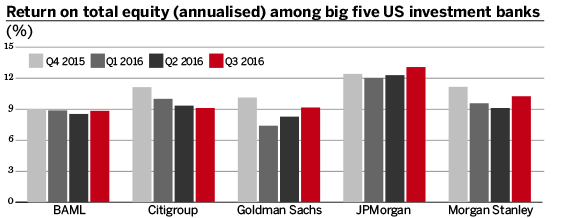Top five US banks report healthy profits while peers tighten belts
The events of 2016 have taken its toll on many lenders’ balance sheets, but not the US’s big five investment banks. Danielle Myles looks at their profits and revenue, as revealed by quarterly earnings reports.
Not so long ago, the US’s biggest investment banks were still being blamed for bringing the global financial system to near collapse. As 2016 draws to a close, they have become a source of much-needed stability as the country enters on a period of political uncertainty.
The solvency and liquidity of the US’s top five investment banks has been secured for some time, thanks to global reforms designed to shore up systemically important financial institutions. But their profitability and ability to generate revenue from businesses that other banks have been forced to cut back is a key theme from their 12-month earnings reports covering October 2015 to September 2016.
Return on equity
Return on equity (ROE), being pre-tax profits divided by total equity, is the yardstick of bank profitability. Historically, a 10% ROE was the rough benchmark for bulge-bracket banks, but rising regulatory costs have made this difficult to attain in recent years. Nonetheless, as of the third quarter of 2016, JP Morgan and Morgan Stanley’s annualised ROE ratios hit 13.06% and 10.24%, respectively, while Citigroup and Goldman Sachs’ hovered above 9%.
In announcing their latest results, Morgan Stanley noted its performance in wealth management and sales and trading, Citigroup its investment bank’s year-over-year revenue increase in nearly every business and geography, and JP Morgan its record net income in commercial banking.
According to analytics firm Coalition, in the first half of 2016, the average ROE among the world’s 12 biggest investment banks was 8.1%. All five US companies exceeded this by between 0.43% (Bank of America Merrill Lynch, or BAML) and 4.18% (JP Morgan). Between the first and second quarters, all of their pre-tax profits surged; Citigroup’s 15.7% was the smallest increase while Goldman Sachs’ profits were up 56.28%.
Trading, fees and commission
As many banks in Europe pare back their capital-intensive trading activities, those in the US have seen a huge uptick in trading income (encompassing securities, derivatives and currencies) over the past 12 months. Third-quarter 2016 trading revenues were bolstered by volatility following the surprise outcome of the UK’s Brexit referendum.
While Morgan Stanley’s overall trading income dropped 4.99% over these three months, its fixed-income sales and trading revenues increased by 15.38%. Goldman Sachs’ revenues from fixed income, currency and commodities grew a marginal 1.55% in the same period.
In contrast, net fees and commissions (those received from all services, transactions and sales) have been relatively stable. Citigroup’s dipped 8.37% between the fourth quarter of 2015 and the first quarter of 2016, before recovering 10.05% the following quarter.
However, both Citigroup’s and Morgan Stanley’s fees and commissions were dwarfed by JP Morgan and BAML, the US’s two biggest banks by Tier 1 capital. Only JP Morgan finished the 12-month period higher than it started, nudging up 2.76%.
In terms of profitability and income from trading, fees and commission, JP Morgan leads in the overall figures as well as growth since the fourth quarter of 2015. The only exception is trading income growth, as Citigroup’s surged 316% over the 12-month period. However, this can be partly attributed to its unusually low starting point of $537m, down 59.53% from the previous quarter.
All data refers to the consolidated entity, not just the investment banking divisions



